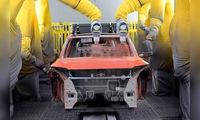In a shocking revelation, approximately 900 car engines have been stolen from the Kia Motors manufacturing plant near Penukonda in Sri Sathya Sai district, Andhra Pradesh, over the past five years. The theft, which began in 2020, came to light during a year-end audit conducted by the company in March 2025. This prompted Kia Motors to file a formal complaint with the Penukonda Industrial Estate police station on March 19, following an earlier informal inquiry.
Initial police suspicions that the engines might have been stolen during transport from Tamil Nadu to the Penukonda plant were ruled out after evidence indicated the theft occurred at the facility itself. Investigators discovered that records had been tampered with to conceal the missing engines.
Sri Sathya Sai district Superintendent of Police (SP) V Rathna visited the Kia Motors plant to assess the situation and personally examine company records. He stated, “We have formed three special teams to investigate the case. Our teams are travelling across the country to collect crucial documents, and the investigation is progressing swiftly.”
Police are still working to determine the exact methods used by the perpetrators, which they expect to uncover once suspects are apprehended. The investigation remains ongoing, with efforts focused on identifying those responsible.
Kia Motors has clarified that the theft has not impacted its operations. A company spokesperson said, “We roll out around 300,000 to 400,000 vehicle units annually depending on demand, and the theft of 900 car engines hasn’t affected production output in any way.” The company has declined to disclose further details, citing the ongoing police investigation.
The plant in Andhra Pradesh continues to operate normally despite the loss of the engines over the five years. Penukonda Deputy Superintendent of Police (DSP) Y Venkateswarulu, who is involved in the investigation, said, “As per preliminary police investigation, 900 car engines were stolen in a phased and planned manner over the last five years. This is definitely an insider’s job, and we suspect collusion between former and current employees at Kia Motors in this organised engine theft.”
With the investigation still in its early stages, police are piecing together the timeline of the thefts and the identities of those involved. It’s a complex case that raises questions about security protocols at the plant and the potential for internal collusion.
The company’s ability to maintain production levels despite the theft is a testament to its operational resilience. However, the implications of such a large-scale theft could lead to increased scrutiny of security measures and employee vetting processes at manufacturing plants across the region.
As the story unfolds, both Kia Motors and the authorities are under pressure to ensure that those responsible are brought to justice. The incident highlights the vulnerabilities that can exist even in well-established manufacturing environments, where trust is paramount.
In the coming weeks, as investigations continue, more information is expected to emerge regarding the methods used in the theft and the individuals involved. The case serves as a reminder of the importance of stringent oversight and the need for companies to remain vigilant against internal threats.
As police continue their investigations, the outcome of this case could have broader implications for the automotive industry in India, where manufacturing plants are often targets for theft and fraud. Ensuring the integrity of operations is crucial not only for companies like Kia Motors but also for maintaining consumer confidence in the industry as a whole.






